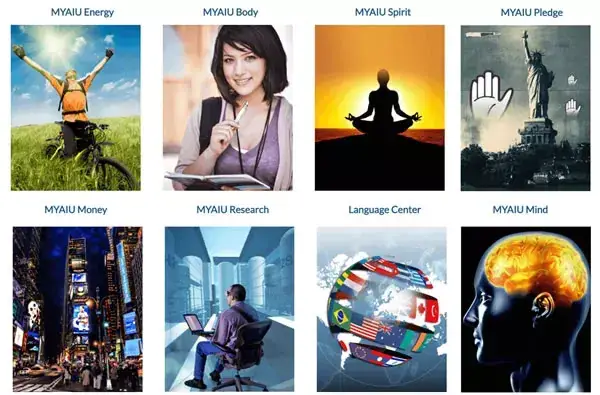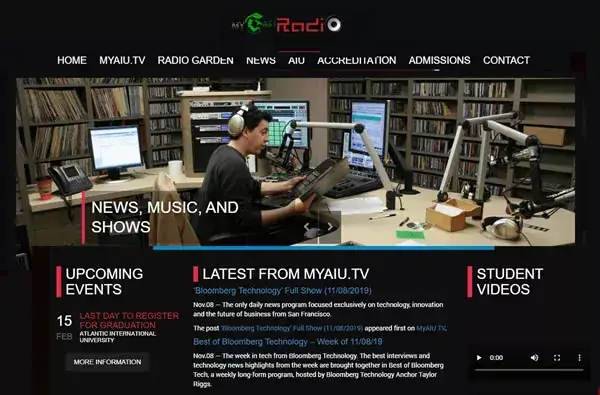- RESEARCHDistance Learning at AIU is enhanced by vast academic resources and innovative technologies build into the Virtual Campus: Hundreds of self-paced courses with video lectures and step by step lessons, thousands of optional assignments, 140,000 e-books, the Social Media & Networking platform allowing collaboration/chat/communications between students, and MYAIU develop students holistically in 11 areas beyond just academics.
- PROGRAMS OFFERED
- Areas of Study
- Courses and Curriculum
- Open Courses
- Register for a Program
- Associate Program
- Associate in Addiction Counseling
- Associate in Agriculture Food And Resources
- Associate in Anti Terrorism Security
- Associate in Behavior Analysis In Special Education
- Associate in Bioethics
- Associate in Climatology
- Associate in Cultural Theological Communication
- Associate in Culinary Arts
- Associate in Ecotechnology
- View all Associates Programs
- Bachelor Program
- Bachelors in Community Development
- Bachelors in Environmental Science
- Bachelor in Education (B.Ed, BS)
- Bachelors in Economics
- Bachelors in Entrepreneurship
- Bachelors in Financial Administration
- Bachelors in Human Resource Management
- Bachelors in Linguistics
- Bachelors in Nutritional Science
- Bachelors in Occupational Health and Safety
- Bachelors in Psychology
- View all Bachelor Programs
- Doctorate Program
- Doctor | of Biology (PhD)
- Doctorate in Business Administration (DBA, PhD)
- Doctor of Economics (PhD)
- Doctor of Electrical Engineering (D.Sc, PhD)
- Doctor of Finance (PhD)
- Doctorate in International Relations
- Doctorate in Information Technology (D.Sc)
- Doctor of Legal Studies (PhD)
- Doctor of Project Management (PhD)
- Doctor of Sociology (PhD, D.Sc)
- Doctorate in Sustainable Natural Resources Management
- View all Doctorate Programs
- Master Program
- Postdoctoral Program
- Postdoctoral in Animal Science
- Postdoctoral in Anti Terrorism Security
- Postdoctoral in Behavior Analysis In Special Education
- Postdoctoral in Bioethics
- Postdoctoral in Blockchain Technology and Digital Currency
- Postdoctoral in Business Management
- Postdoctoral in Cloud Computing
- Postdoctoral in Computer Engineering
- View all Postdoctoral Programs
AIU offers a wide range of majors in areas including the Arts, Business, Science, Technology, Social, and Human studies. More than 120 degrees and programs are available for adult learners at the associate’s, bachelor’s, master’s, doctoral and postdoctoral level. - VIRTUAL CAMPUS
Distance Learning at AIU is enhanced by vast academic resources and innovative technologies build into the Virtual Campus: Hundreds of self-paced courses with video lectures and step by step lessons, thousands of optional assignments, 140,000 e-books, the Social Media & Networking platform allowing collaboration/chat/communications between students, and MYAIU develop students holistically in 11 areas beyond just academics.
- ALUMNI
The world is YOUR campus!”, that is the message of AIU’s month magazine Campus Mundi. Hear the voices and see the faces that make up AIU. Campus Mundi brings the world of AIU to you every months with inspirational stories, news and achievements by AIU members from around the world (students and staff are located in over 200 countries).
Bachelors in Zoology
School of Science & Engineering
Academic Freedom to Discover Your Purpose
Open Curriculum Design at Atlantic International University
Atlantic International University (AIU) offers an innovative online Bachelor’s in Zoology program, providing students with the flexibility to pursue their passion for wildlife from anywhere in the world. This dynamic program combines rigorous academic coursework with practical field experience, allowing students to delve into the fascinating world of animal biology, behavior, and conservation on their own schedule.
The online format of the program offers unparalleled flexibility, catering to the diverse needs of working professionals, busy parents, and individuals with other commitments. Through asynchronous learning, students can access lectures, assignments, and interactive course materials at their convenience, empowering them to balance their education with personal and professional responsibilities.
Moreover, AIU’s dedicated faculty and support staff ensure that students receive personalized attention and guidance throughout their academic journey. Whether aspiring to become wildlife biologists, conservationists, or zookeepers, graduates of AIU’s online Bachelor’s in Zoology program emerge with the knowledge, skills, and practical experience needed to thrive in a variety of life sciences and animal-related careers.
Important: Below is an overview of the subjects and areas available for exploration and involvement during your academic pursuit. It’s essential to recognize that this compilation is not comprehensive or obligatory, as AIU’s graduate school programs may deviate from standardized curricula. Its primary aim is to act as a guide and visual tool. Would you like to further explore the details of the curriculum framework at AIU?
Contact Us Today!
Begin Your Journey!
AIU’s Summer of Innovation and Growth gives you the ability to earn up to $5000 in tuition credit by completing free lessons and courses.
Whether you’re looking to acquire new skills, advance your career, or simply explore new interests, AIU is your gateway to a world of opportunities. With free access to 3400 lessons and hundreds of courses the ability to earn credits and earn certificates there’s no better time to start learning.
Join us today as a Guest Student and take the first step towards a brighter, more empowered future.
Explore. Learn. Achieve.
Courses and Topics in Bachelors in Zoology
In the Bachelor’s in Zoology program at AIU, students can expect to study a variety of courses and topics relevant to the field of zoology. These may include animal biology, ecology, genetics, animal behavior, physiology, conservation biology, wildlife management, taxonomy, and evolutionary biology. Through a comprehensive curriculum, students gain a deep understanding of the diversity of animal life, their habitats, behaviors, and the ecological processes that govern their interactions.
Additionally, practical components such as fieldwork, laboratory experiments, and research projects provide hands-on experience to complement theoretical learning.
- Animal Biology
- Genetics
- Physiology
- Wildlife Management
- Evolutionary Biology
- Animal Physiology
- Ethology
- Ornithology
- Mammalogy
- Endocrinology
- Population Ecology
- Ecosystem Ecology
- Field Methods in Zoology
- Wildlife Conservation Strategies
- Animal Reproduction
- Ecology
- Animal Behavior
- Conservation Biology
- Taxonomy
- Comparative Anatomy
- Marine Biology
- Entomology
- Herpetology
- Parasitology
- Neurobiology
- Community Ecology
- Environmental Science
- Research Methods in Zoology
- Animal Nutrition
- Animal Welfare and Ethics
Orientation Courses
The course orientation for the Bachelor’s in Zoology at AIU provides students with a comprehensive overview of the program’s structure, objectives, and expectations. During orientation, students are introduced to the faculty, support staff, and resources available to them throughout their academic journey. They receive guidance on navigating the online learning platform, accessing course materials, and participating in discussions and assignments.
Additionally, orientation sessions may cover academic policies, program requirements, and opportunities for fieldwork or research projects. Overall, the course orientation aims to ensure that students are well-equipped to succeed in their studies, understand the program’s curriculum, and feel supported as they embark on their educational endeavor in zoology.
- Communication & Investigation (Comprehensive Resume)
- Experiential Learning (Autobiography)
- Seminar Cultural Development (Practical Experience)
- Organization Theory (Portfolio)
- Seminar Administrative Development (Book Summary)
- Seminar International Development (Publications)
Research Projects in Bachelors in Zoology
In the Bachelor’s in Zoology program, students at AIU have the opportunity to engage in research projects that deepen their understanding of animal biology, behavior, and ecology. These research projects provide hands-on experience in conducting scientific investigations, analyzing data, and drawing meaningful conclusions. Under the guidance of faculty mentors, students may design and execute their research studies, exploring topics such as habitat preferences of specific species, the impact of environmental factors on animal populations, or the effects of human activities on wildlife behavior.
Through research projects, students develop critical thinking, problem-solving, and research skills essential for careers in zoology, conservation biology, and related fields. Additionally, these projects may contribute to scientific knowledge by uncovering new insights into animal behavior, biodiversity, and ecosystem dynamics. Overall, research projects play a vital role in preparing students for future endeavors in academia, industry, or environmental advocacy, while fostering a deeper appreciation for the natural world.
- MBM300 Thesis Proposal
- MBM302 Bachelor Thesis (5,000 words)
Publication: Graduates of Zoology courses at AIU are urged to contribute to academic discourse by publishing their research papers. Encouraging dissemination through journals, periodicals, or web portals ensures their valuable insights reach a broader audience, fostering knowledge sharing and advancing the field of Zoology.
Explore the fascinating realms of animal biology, behavior, and conservation
Apply Now for Admission
Transformative Bachelor’s Degree Student Journey at AIU
Embarking on a Bachelor’s in Zoology degree journey at AIU is a transformative experience, marked by intellectual growth, hands-on learning, and a deepening appreciation for the natural world. Throughout their studies, students engage in a diverse array of courses, fieldwork, and research projects, immersing themselves in the fascinating realms of animal biology, behavior, and conservation.
As they progress through the program, students undergo a profound transformation, developing a keen understanding of the complexities of life on Earth and the interconnectedness of all living organisms. They hone their analytical skills, critical thinking abilities, and scientific inquiry methods, preparing them for careers in wildlife biology, environmental conservation, or further academic pursuits.
Moreover, the journey instills in students a sense of responsibility towards the preservation of biodiversity and the protection of endangered species, empowering them to become advocates for environmental stewardship and champions of wildlife conservation. Ultimately, the Bachelor’s in Zoology degree journey at AIU equips students with the knowledge, skills, and passion to make a meaningful impact in the field of zoology and beyond.
Community & Social
The online program at AIU cultivates an energetic community using cutting-edge technologies and collaborative tools, ensuring a nurturing academic journey. Through platforms like the Virtual Campus, Mobile APP, MYAIU, AIULink, and AIUTV, students, faculty, and alumni unite, creating a network of interconnected minds. Engaging in thought-provoking symposiums, webinars, and conferences fosters global connections among the various community members.
Accessing the Merlin Media Center provides a wealth of academic resources while staying linked through AIULink, which ensures ongoing connectivity. The AIU Virtual Campus, APP compatible with Android and iOS, offers effortless access to programs, tools, and academic resources. These platforms facilitate sharing personal narratives, exploring holistic development, and contributing to the betterment of humanity, shaping an unparalleled AIU experience.
Academic Resources
At AIU, the Virtual Campus is an innovative center equipped with more than 25 specialized tools, all geared towards supporting and empowering students throughout their educational endeavors. Our newest feature, the Virtual Reality 3D immersive experience, elevates community interaction and nurtures growth, motivation, and inspiration among our diverse student population.
Also, AIU includes the leading Artificial intelligence (AI) tools such as ChatGPT, Dall-E and Midjoruney, PDF Executive Assistance, and Slide Generator, plus others, and is adding new AI tools to ensure students are fluent in this emerging trend and benefit from the boost in productivity they bring.
Within our extensive online library, comprising 260,000 books and 30 million peer-reviewed articles, alongside 105,000 resources co-curated by the AIU community, we establish an unmatched academic setting dedicated to fostering our students’ growth, development, and success.
Virtual Campus
Complete assignments online or offline at your convenience with 24/7 access to distance learning through AIU’s Virtual Campus. Step by Step guides including videos, tutorials, live webinars and examples for each course. All materials can be access on all web browsers as well as via AIU's Mobile App which brings all the features of the Virtual Camus to your Mobile Device.
My AIU Elements
MyAIU’s primary goal is to go beyond Academics, it looks to guide students through 11 elements that are key to living life optimally in all aspects. By identifying and reflecting on these key areas, an opportunity arises to holistically address them, through positive change, habits, reinforcement and tools to keep students on their chosen path.
AIU TV & Radio
The students have the opportunity to produce, edit and host their own show reaching a worldwide audience, the AIU community and giving notice of their expertise/passion in the subject. AIUTV & AIU Radio allow students to explore new ways to communicate, develop a platform and form potential collaboration with likeminded individuals.
AIU Campus Mundi
AIU Campus Mundi is a monthly magazine that gathers the most notable news and information about the university and its members in one convenient place. The magazine allows our community to be well informed, involved and keep in tough regardless of their geographic location. AIU Campus Mundi publishes, news, research, events, awards, academic achievements.
Graduation Ceremony
Each year AIU organizes graduation ceremonies where the students can assist and share their experiences with fellow students and academic members Participation in the ceremony is optional, the day’s events include conferences, research presentations, group meetings, networking, lunch and formal dinner.
Symposiums & Webinars
AIU’s symposiums serve as crucial hubs for knowledge and innovation, creating an interactive platform for students in creative fields. These events are instrumental in disseminating groundbreaking research, facilitating dynamic exchanges of ideas, and nurturing lively discussions.
Live Classes
AIU introduces an innovative approach to virtual learning by incorporating dynamic live sessions twice daily. One can also access these live classes from the archive that hosts 100s of courses that can be combined to personalize a student’s academic journey. Led by seasoned faculty and experts from various industries, these sessions offer real-time discussions, interactive Q&A segments, and collaborative problem-solving, enriching your comprehension of community.
Participating in these sessions augments your expertise, equipping you to shape policies and refine your skills in hospitality. AIU’s live classes promise intellectually engaging dialogues, up-to-the-minute industry perspectives, and individualized instructor feedback, guaranteeing a rewarding journey through the study of Zoology.
Special Projects, Research, Publications, and Co-Authoring
In the Bachelor’s in Zoology program at AIU, students have the opportunity to engage in special projects, research initiatives, and co-authoring publications under the guidance of faculty mentors. These endeavors allow students to delve deeper into areas of interest within the field of zoology, conducting original research, and contributing to the body of scientific knowledge.
Through hands-on experience in fieldwork, laboratory experiments, and data analysis, students develop valuable research skills and critical thinking abilities. Moreover, collaborating with faculty members or peers on publications provides students with the chance to showcase their findings and insights to the broader scientific community. These experiences not only enhance students’ academic and professional portfolios but also foster a deeper appreciation for the intricacies of animal biology, behavior, and conservation.
Unlock exciting career opportunities in wildlife research, conservation, and education
Explore Our Live Classes
Career Center for Bachelors in Zoology
The Career Center for Bachelors in Zoology at AIU offers comprehensive support and resources to help students transition from academia to rewarding careers in the field of zoology. Through personalized career counseling sessions, students receive guidance on exploring various career paths, refining their job search strategies, and preparing for interviews.
The Career Center also facilitates networking opportunities with professionals in the zoology industry, internship placements, and access to job postings in wildlife conservation organizations, research institutions, zoos, and government agencies.
Additionally, workshops and seminars on resume writing, interview skills, and professional development equip students with the necessary tools to succeed in the competitive job market. Overall, the Career Center aims to empower Bachelors in Zoology graduates to pursue fulfilling and impactful careers aligned with their interests and aspirations.
Job Description
A student of zoology typically conducts research on various aspects of animal biology, behavior, and ecology. They may participate in fieldwork to observe and collect data on animal populations, analyze specimens in laboratory settings, and assist with conservation efforts. Additionally, they engage in coursework to deepen their understanding of evolutionary principles, taxonomy, and environmental science. Through internships or volunteer opportunities, zoology students also gain practical experience in wildlife management, research methodologies, and data analysis. Overall, students of zoology develop the skills and knowledge necessary for careers in wildlife conservation, research, education, or environmental advocacy.
Employment Opportunities for Bachelors in Zoology
- Wildlife Biologist: Conduct research on animal populations, behavior, and habitats to inform conservation and management efforts.
- Conservation Scientist: Develop and implement strategies to protect and restore endangered species and their ecosystems.
- Zookeeper: Care for animals in zoos, wildlife parks, or aquariums, ensuring their well-being and enrichment.
- Environmental Educator: Educate the public about wildlife conservation, ecology, and environmental issues through outreach programs, schools, or nature centers.
- Research Assistant: Assist scientists with fieldwork, data collection, and analysis in research laboratories, government agencies, or nonprofit organizations.
- Wildlife Rehabilitation Specialist: Provide medical care and rehabilitation to injured or orphaned wildlife, preparing them for release back into their natural habitats.
- Park Ranger: Manage and protect natural resources in national parks, wildlife refuges, or conservation areas, enforcing regulations and educating visitors about wildlife conservation.
- Laboratory Technician: Work in research laboratories or diagnostic facilities, conducting tests and experiments related to animal physiology, genetics, or pathology.
- Environmental Consultant: Advise businesses, government agencies, or nonprofit organizations on environmental impact assessments, conservation planning, and regulatory compliance.
- Wildlife Photographer or Filmmaker: Capture images and footage of wildlife and natural habitats for educational, documentary, or commercial purposes.
These are just a few examples of the diverse career paths available to Bachelors in Zoology graduates from AIU, with opportunities in research, conservation, education, wildlife management, and more.
Tools for Professionals with Bachelors in Zoology
These software tools cover a range of functionalities relevant to zoology majors and to professionals with a Bachelor’s degree in Zoology, from statistical analysis to geographic information systems and molecular biology.
Associations for Professionals with Bachelors in Zoology
These associations offer opportunities for networking, professional development, and staying updated with the latest advancements in zoological research, conservation, and education.
American Society of Zoologists (ASZ): ASZ is a professional organization dedicated to the advancement of zoological research, education, and conservation. It provides networking opportunities, publishes journals, and organizes conferences and symposiums.
The Wildlife Society (TWS): TWS is a nonprofit organization focused on wildlife management, conservation, and research. It offers professional development resources, publishes scientific journals, and advocates for wildlife policies and practices.
Ecological Society of America (ESA): ESA is a professional organization promoting ecological science and its application to environmental issues. It offers networking opportunities, publishes research journals, and organizes conferences and workshops.
Society for Integrative and Comparative Biology (SICB): SICB is an association dedicated to the study of biology from an integrative and comparative perspective. It covers various fields of biological sciences including zoology, ecology, evolution, and physiology, and provides platforms for interdisciplinary collaboration.
Association of Zoos and Aquariums (AZA): AZA is a nonprofit organization representing zoos, aquariums, and wildlife conservation centers. It sets standards for animal care and welfare, provides accreditation, and supports conservation initiatives worldwide.
Society for Conservation Biology (SCB): SCB is an international organization dedicated to advancing the science and practice of conservation biology. It offers networking opportunities, publishes scientific journals, and advocates for conservation policies and practices.
American Fisheries Society (AFS): AFS is a professional society focused on fisheries science, conservation, and management. It provides resources for professional development, publishes scientific journals, and advocates for sustainable fisheries practices.
The Society for Marine Mammalogy (SMM): SMM is a professional association dedicated to the study and conservation of marine mammals. It organizes conferences, publishes journals, and supports research and education initiatives in marine mammal science.
Association for Tropical Biology and Conservation (ATBC): ATBC is an international organization promoting research, education, and conservation in tropical biology. It organizes conferences, publishes journals, and supports interdisciplinary collaboration among scientists, conservationists, and policymakers.
National Association of Biology Teachers (NABT): NABT is a professional association for biology educators at all levels, from K-12 to college. It provides teaching resources, professional development opportunities, and advocates for effective biology education.
Flexible online learning options available! Enroll now and embark on a journey of discovery with AIU!
Request for more information
Bachelors in Zoology Requirements
To pursue a Bachelor’s in Zoology, applicants typically need a high school diploma or equivalent. Admission requirements vary among institutions but commonly include completing prerequisite courses in biology, chemistry, mathematics, and physics during high school. Additionally, submitting standardized test scores like the SAT or ACT may be necessary. Some colleges and universities may have specific GPA requirements or expect students to demonstrate interest in zoology through extracurricular activities or letters of recommendation.
Once enrolled, students can expect to undertake coursework covering topics such as animal biology, ecology, genetics, and conservation. Practical experience, through fieldwork or internships, is often encouraged to complement theoretical learning one course, and prepare students for careers or further studies in zoology-related fields.
How Can You Apply?
To apply for a Bachelor’s in Zoology program, typically, you need to complete the college or university’s application process. This often involves submitting an online application form along with supporting documents such as transcripts, standardized test scores (e.g., SAT or ACT), letters of recommendation, and a personal statement or essay. Some institutions may require additional materials or have specific admission requirements, so it’s essential to review the application guidelines provided by each school. Once your application is complete, the admissions committee will evaluate your qualifications and make decisions based on academic achievements, extracurricular activities, and other relevant factors.
Financial Support & Scholarships
We’re excited to present an array of bachelor of science scholarships crafted for our bachelor of science students. Kindly share your details to unlock numerous bachelors of science scholarship possibilities to bolster your academic endeavors. Allow us to aid you in reaching your educational aspirations and fostering your scholarly pursuits.
How Much Does Bachelor in Zoology Cost Per Year?
We recognize the significance of financial flexibility in your educational endeavors. Hence, depending on the type of degree requirements and of program you choose, we have introduced a convenient monthly payment plan to make your pursuit of a bachelor’s degree or master’s degree more manageable and freer from financial worries. Our exceptionally affordable tuition fee covers the expense of Zoology degree programs. So, secure your future with AIU, where first-rate education aligns perfectly with your budget. Your aspirations are well within your grasp.
FAQs
What subjects are covered in a Bachelors in Zoology degree program?
A Bachelor’s in Zoology program typically covers subjects such as animal biology, ecology, evolution, genetics, physiology, anatomy, animal behavior, conservation biology, and wildlife management. Students study the diversity of animal life, their habitats, and the interactions between organisms and their environments. They may also delve into topics like animal taxonomy, marine biology, animal husbandry, and research methodologies. Practical components of introductory biology also often include fieldwork, laboratory experiments, and internships to provide hands-on experience in studying and understanding various animal species and their ecosystems.
What career opportunities are available for Zoology graduates?
Zoology graduates have diverse career opportunities in fields such as wildlife conservation, research, environmental consulting, zookeeping, animal rehabilitation, and education. They can work as wildlife biologists, conservation scientists, zoo or aquarium curators, park rangers, animal behaviorists, or environmental educators. Graduates may also pursue roles in veterinary medicine, pharmaceuticals, agriculture, or government agencies focused on wildlife management and policy-making. Additionally, opportunities exist in scientific writing, museum curation, and outreach programs aimed at raising awareness about conservation issues and promoting sustainable practices for the protection of animal species and their habitats.
Can I specialize in a particular area within Zoology during my undergraduate studies?
Undergraduate students in the Zoology major can often specialize in specific areas through elective courses, research opportunities, and concentrations within their program. Common specializations include marine biology, ecology, animal behavior, genetics, conservation biology, and physiology. Students may tailor their coursework and research projects to focus on their chosen area of interest, allowing them to gain in-depth knowledge and skills relevant to their desired career path or further academic pursuits. Specialization can provide a strong foundation for pursuing graduate studies or entering specific sectors of the workforce, such as wildlife conservation or research.
Do Zoology programs include practical or fieldwork experience?
Zoology programs typically include practical components such as fieldwork, laboratory experiments, and internships to provide hands-on experience. Fieldwork allows students to observe animals in their natural habitats, conduct ecological surveys, and collect data for research projects. Laboratory experiments provide opportunities to study animal anatomy, physiology, and behavior, often using live specimens or models. Internships with wildlife rehabilitation centers, zoos, or research institutions offer real-world experience in animal care, conservation efforts, and scientific research. These practical experiences enhance students’ skills, understanding, and readiness for careers in zoology and related fields.
Are there any research opportunities for undergraduate students in Zoology?
Undergraduate students in Zoology often have access to research opportunities within their academic institutions. These opportunities may involve assisting faculty members with ongoing research projects, conducting independent research under faculty supervision, or participating in summer research programs. Students can explore diverse areas of zoological research, such as animal behavior, ecology, genetics, conservation biology, and physiology. Engaging in research allows students to develop critical thinking, experimental design, and data analysis skills while contributing to scientific knowledge in their field of interest. It also strengthens their academic credentials and prepares them for future careers or graduate studies in zoology.

Contact Us
Atlantic International University
900 Fort Street Mall 905 Honolulu, HI 96813 info@aiu.edu
Quick Links
Home | Online Courses | Available Courses | Virtual Campus | Career Center | Available Positions | Ask Career Coach | The Job Interview | Resume Writing | Accreditation | Areas of Study | Bachelor Degree Programs | Masters Degree Programs | Doctoral Degree Programs | Course & Curriculum | Human Rights | Online Library | Representations | Student Publication | Sponsors | General Information | Mission & Vision | School of Business and Economics | School of Science and Engineering | School of Social and Human Studies | Media Center | Admission Requirements | Apply Online | Tuition | Faculty & Staff | Distance Learning Overview | Student Testimonials | AIU Blogs | Register for Program | Privacy Policy | FAQ































